Sign up for our newsletter
Subscribe to our emails

It is a time of unrest in 1920s Europa. The ashes from the first great war still darken the snow. The capitalistic city-state known simply as “The Factory”, which fueled the war with heavily armored mechs, has closed its doors, drawing the attention of several nearby countries.Scythe is an engine-building game set in an alternate-history 1920s period. It is a time of farming and war, broken hearts and rusted gears, innovation and valor. In Scythe, each player represents a character from one of five factions of Eastern Europe who are attempting to earn their fortune and claim their faction's stake in the land around the mysterious Factory. Players conquer territory, enlist new recruits, reap resources, gain villagers, build structures, and activate monstrous mechs.Each player begins the game with different resources (power, coins, combat acumen, and popularity), a different starting location, and a hidden goal. Starting positions are specially calibrated to contribute to each faction’s uniqueness and the asymmetrical nature of the game (each faction always starts in the same place).Scythe gives players almost complete control over their fate. Other than each player’s individual hidden objective card, the only elements of luck or variability are “encounter” cards that players will draw as they interact with the citizens of newly explored lands. Each encounter card provides the player with several options, allowing them to mitigate the luck of the draw through their selection. Combat is also driven by choices, not luck or randomness.Scythe uses a streamlined action-selection mechanism (no rounds or phases) to keep gameplay moving at a brisk pace and reduce downtime between turns. While there is plenty of direct conflict for players who seek it, there is no player elimination.Every part of Scythe has an aspect of engine-building to it. Players can upgrade actions to become more efficient, build structures that improve their position on the map, enlist new recruits to enhance character abilities, activate mechs to deter opponents from invading, and expand their borders to reap greater types and quantities of resources. These engine-building aspects create a sense of momentum and progress throughout the game. The order in which players improve their engine adds to the unique feel of each game, even when playing one faction multiple times.
£80.00 £72.00

In this classic word game, players use their seven drawn letter-tiles to form words on the gameboard. Each word laid out earns points based on the commonality of the letters used, with certain board spaces giving bonuses. But a word can only be played if it uses at least one already-played tile or adds to an already-played word. This leads to slightly tactical play, as potential words are rejected because they would give an opponent too much access to the better bonus spaces.
£21.99 £19.80

In Scotland Yard, one of the players takes on the role of Mr. X. His job is to move from point to point around the map of London taking taxis, buses or subways. The detectives – that is, the remaining players acting in concert – move around similarly in an effort to move into the same space as Mr. X. But while the criminal's mode of transportation is nearly always known, his exact location is only known intermittently throughout the game.The 125 fare tickets are 5 black, 23 pink underground, 43 green bus, 54 yellow taxi.Similar to The Fury of Dracula Clue: The Great Museum Caper Ghost Chase Letters from Whitechapel Garibaldi: The Escape
£25.00 £22.50
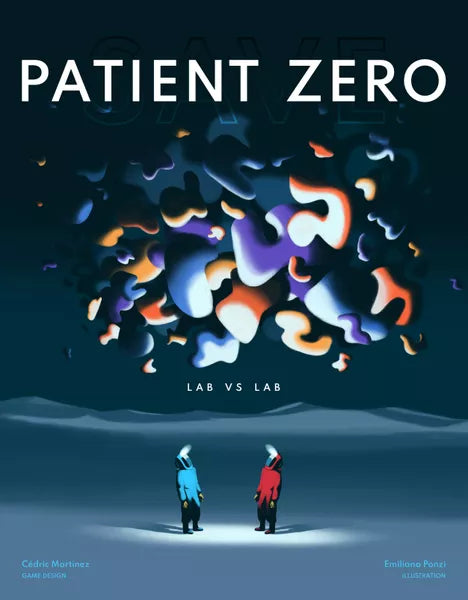
A new pathology has just appeared! Patient Zero has been identified, and it's up to you to find the antidote as soon as possible to save the patient and humanity!Save Patient Zero pits two labs against each other. Each lab employs one or two scientists (i.e., players), while another player plays a lab computer named Savvy. The labs compete to identify an antidote of three molecules, with the labs typically sharing no information with one another; whichever lab finds the antidote first wins.The general idea of the game is to use lab tools in the best sequence possible to identify the three molecules out of 25 that make up the antidote. (These 25 molecules are arranged in a 5x5 grid on each lab's worksheet.) At the start of the game, Savvy looks at the top three molecule cards in that deck, then sets them aside. These are the molecules the labs must identify. On a turn, each lab submits a tool card to Savvy to show what they want to do in the round, and whichever lab submits first takes its action first in that round. Actions include: Samply: Draw three sample cards from your lab's deck, and give them to Savvy. Each sample card depicts five molecules, and Savvy will identify which of them show at least one molecule used in the antidote. Mikroskopo: Choose two cards from your lab's deck, and give them to Savvy, who will treat them like the cards in "Samply". Dedukto: Receive five molecule cards from Savvy. You (but not the other lab) now know these molecules are not in the antidote. Centrofugo: Place your centrifuge on your lab worksheet so that it points to four molecules. Savvy then indicates whether any of these molecules are in the antidote. Scanpad: Place a cardboard device on your worksheet to highlight six molecules in a 2x3 grid. Savvy then indicates how many molecules highlighted (0-3) are part of the antidote. Spionado: Savvy takes two lab cards from the opposing lab that do not have any molecules in the antidote on them, then shows them to you. Antidote: Circle three molecules on your worksheet. If all three are in the antidote, you win! If not, Savvy will indicate how many of the circled molecules are in the antidote.Each lab has a limited number of actions in its deck — eighteen total, with three Samply, two Dedukto, one Scanpad, two Antidote, etc. — so use them wisely, especially the Antidote because if you fail to identify the correct three molecules a second time, then your lab loses the game automatically.To play Save Patient Zero as a two-player game, each lab draws three molecule cards from the deck, and the opposing lab must identify these three molecules before you can identify the three molecules they drew. Each lab takes the role of Savvy for the opposing lab.
£33.99 £23.80
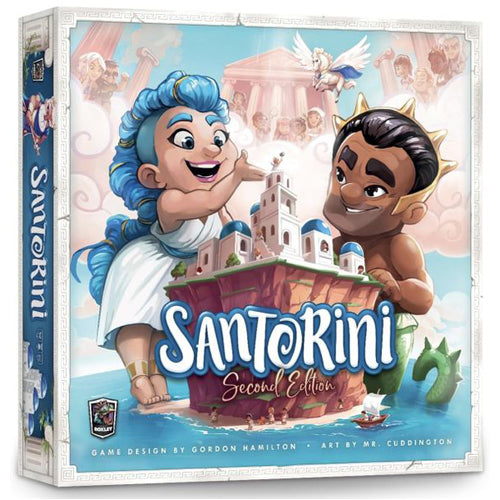
Santorini is an accessible strategy game, simple enough for an elementary school classroom while aiming to provide gameplay depth and content for hardcore gamers to explore, The rules are simple. Each turn consists of 2 steps: 1. Move - move one of your builders into a neighboring space. You may move your Builder Pawn on the same level, step-up one level, or step down any number of levels. 2. Build - Then construct a building level adjacent to the builder you moved. When building on top of the third level, place a dome instead, removing that space from play. Winning the game - If either of your builders reaches the third level, you win. Variable player powers - Santorini features variable player powers layered over an otherwise abstract game, with 40 thematic god and hero powers that fundamentally change the way the game is played.
£43.20

Bread Roles brings an added layer of chaos to the classic Sandwich Masters experience by introducing 10 new role cards, each of which boasts unique game-bending powers. What's more, Bread Roles allows six people to play together for the first time by adding extra cards to the core game.Assume the identity of the Undercover Health Inspector, Flavatron 5000 or Colin the Bear (among others) and let battle commence. Your name may have changed but the challenge remains the same: defeat your rivals and become the one true Sandwich Master!—description from the publisher
£10.00 £6.00
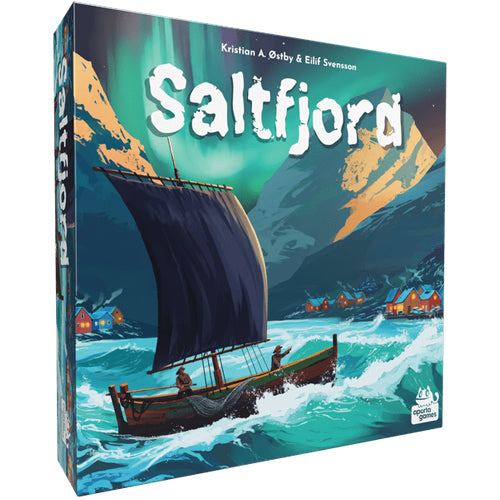
The generations before you have relied on harvesting the oceans. But as the 19th century ends, change and opportunity reach your fishing village in northern Norway.In Saltfjord, you must decide if you will expand your settlement with new buildings, send your boat to collect fish, engage in trade, or pioneer new technologies to make everyday life easier. How will you shape the destiny of your village?Saltfjord is set in a Norwegian fishing village, and is loosely based on the dice drafting mechanisms from "Santa Maria", but the game has otherwise been completely redesigned and expanded with new elements.To add to the replayability, the game has lots of variable elements in the set-up, such as what special abilities and end scoring tiles are available.Over three rounds, players draft dice to activate buildings in their settlement. This provides resources as well as activating actions such as sending out your fishing boat, advancing along the various technology tracks, completing trade orders, or erecting new buildings.Each player's player board shows a grid. When you draft a die, you activate all buildings in the row or column corresponding to that die. By erecting buildings in your settlement, each die can activate more buildings.The technology tracks unlock special abilities, such as upgrading your fishing boat. And fishing is an important part of daily life in Saltfjord.—description from the publisher
£47.30
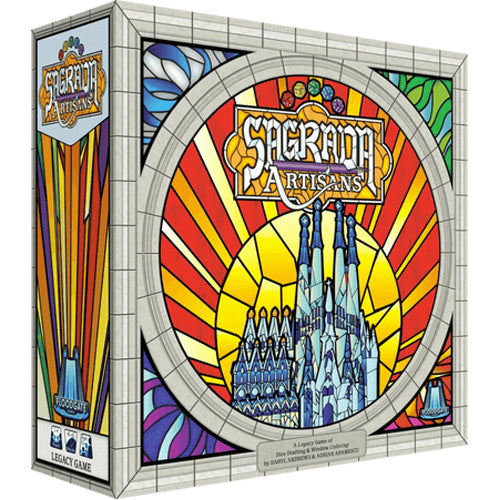
Will your family’s stained-glass legacy stand the test of time? In Sagrada: Artisans you’ll compete as rival families, each chronicling your construction of the cathedral’s windows over a campaign spanning generations.Gain powerful abilities and unlock wondrous new tools that you’ll carry through the campaign...and beyond. By carefully drafting dice and coloring in spaces to most cleverly meet each window’s restrictions and objectives, you will be victorious!
£67.50
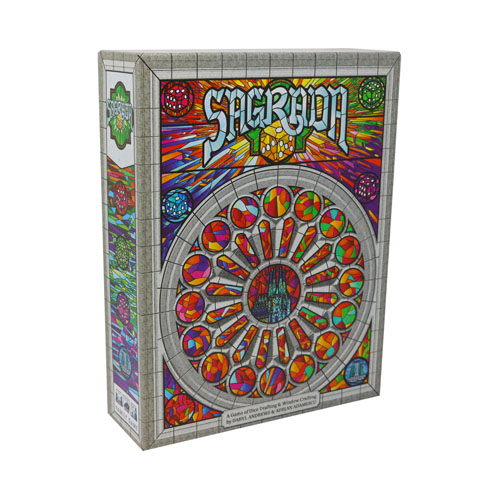
Draft dice and use the tools-of-the-trade in Sagrada to carefully construct your stained glass window masterpiece.In more detail, each player builds a stained glass window by building up a grid of dice on their player board. Each board has some restrictions on which color or shade (value) of die can be placed there. Dice of the same shade or color may never be placed next to each other. Dice are drafted in player order, with the start player rotating each round, snaking back around after the last player drafts two dice. Scoring is variable per game based on achieving various patterns and varieties of placement...as well as bonus points for dark shades of a particular hidden goal color.Special tools can be used to help you break the rules by spending skill tokens; once a tool is used, it then requires more skill tokens for the other players to use them.The highest scoring window artisan wins!
£39.99 £36.00
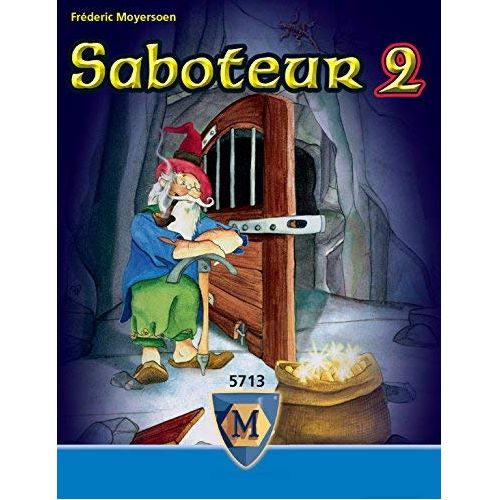
(Note: This listing covers only the expansion-only versions of Saboteur 2; for the Saboteur 2 listing that includes both the base game and the expansion, go to Saboteur (compilation editions).)In Saboteur, each player takes on the role of a gold-digging dwarf or a saboteur who wants to hinder exploration of the gold mines — but each player knows only his own role, so the digging may or may not go as planned!Each turn, a player either lays down a tunnel card to dig from the start card toward one of the goal cards (or potentially away, if a saboteur) or plays an action card to help or hinder someone. If the diggers manage to find the gold hidden under one of the goal cards, then the diggers share the loot found there; if the gold can't be reached before the deck runs out, the saboteurs profit instead. After three rounds, the player with the most gold wins.The Saboteur 2 expansion adds new role cards (the boss, profiteers, geologists) to the base game, new action cards (steal gold, change your role), and new tunnel cards featuring doors, ladders and bridges. What's more, the gold seekers can now be divided into teams — blue vs. green — and only those on the team that finds the gold score anything — assuming that anyone finds the gold at all, of course...
£10.00
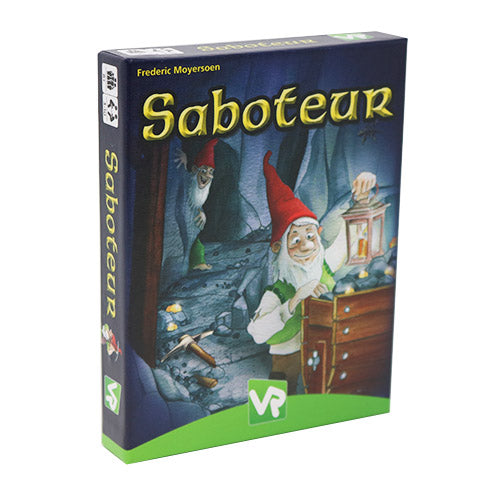
Players take on the role of dwarves. As miners, they are in a mine, hunting for gold. Suddenly, a pick axe swings down and shatters the mine lamp. The saboteur has struck. But which of the players are saboteurs? Will you find the gold, or will the fiendish actions of the saboteurs lead them to it first? After three rounds, the player with the most gold is the winner.With the help of Dwarf Cards, the players are assigned their role: either miner or saboteur. The roles are kept secret- they are only revealed at the end of the round.The Start Card and the three Goal Cards are placed onto the table, each seven cards away from the start and one card between each Goal Card. The Goal Cards are placed face-down. The gold is on one of the Goal Cards, but nobody knows which.Players have cards in hand. On a player's turn, he must do one of three things: place a Path Card into the mine, play an Action Card in front of a player, or pass.The Path Cards form paths leading to the Goal Cards. Path Cards must be played next to a already-played Path Card. All paths on the Path Card must match those on the already-played cards, and Path Cards may not be played sideways.The miners are trying to build an uninterrupted path from the Start Card to a Goal Card, while the saboteurs are trying to prevent this. They shouldn't try and be too obvious about it, however, lest they be immediately discovered.Action Cards can be placed in front of any player, including oneself. Action Cards let the players help or hinder one another, as well as obtain information about the Goal Cards.Once a player places a Path Card that reaches the gold, the round is over. The miners have won and receive cards with gold pieces as their reward.The round is also over if the gold could not be reached. In that case, the saboteurs have won and receive the gold pieces.Once the Gold Cards have been distributed, the next round begins. The game is over at the end of the third round, with the player with the most gold pieces being the winner.
£10.00
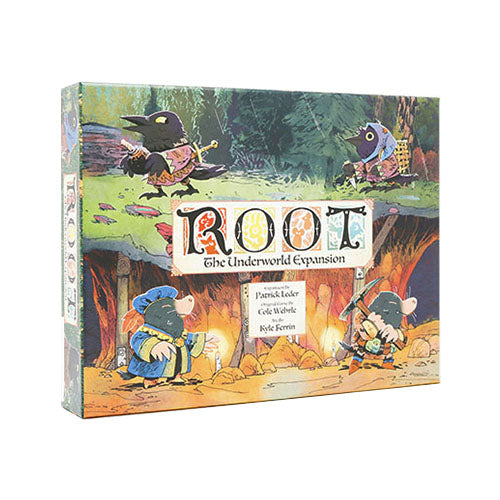
New factions and battlefields join the world of Root!The Underworld Expansion includes: The Great Underground Duchy: an imperial faction that mixes the flexibility of the Marquise with the escalating Eyrie Dynasties. The Corvid Conspiracy: a secretive faction that hatches plots directly into the hands of their opponents. Two new maps: dig tunnels on the mountain map or fight to control the ferry on the lake map.—description from the publisher
£49.99 £45.00
Subscribe to our emails